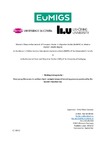Mostrar o rexistro simple do ítem
Waiting in Irregularity: how young Moroccans in southern Spain navigate temporal bordering processes produced by the Spanish migration law
| dc.contributor.advisor | Pérez-Caramés, Antía | |
| dc.contributor.author | Dölker, Rachel | |
| dc.contributor.other | Universidade da Coruña. Facultade de Socioloxía | es_ES |
| dc.date.accessioned | 2022-11-09T08:46:28Z | |
| dc.date.available | 2022-11-09T08:46:28Z | |
| dc.date.issued | 2022 | |
| dc.identifier.uri | http://hdl.handle.net/2183/32001 | |
| dc.description.abstract | [Abstract] El Ejido, in southern Spain, constitutes the densest surface for agroindustry, where manual work is done mainly by migrants. It is a microcosm that particularly encapsulates social problems, struggles, and (state) violence. The thesis exposes practices of temporal bordering, by analysing the role of migration laws, through the lens of waiting. The ‘arraigo social’ is a regulation mechanism, conditioned on a previous three years' irregular stay in the country. Through ethnographic observations and narrative interviews, this paper asks about the function of waiting and how it is experienced and encountered by the people living through this time. To this end, it maps its connections with exploitation of labour, negotiation of belonging and the exertion of state violence. I argue the function is to keep migrants in a situation of a ‘inclusive exclusion’, tantamount to ‘capitalist exploitation’. As through their irregularised stay and the need for an employment contract, they face employers with an extreme power imbalance. | es_ES |
| dc.description.abstract | [Resumen] El Ejido, en el sur de España, constituye la superficie más densa de la agroindustria, donde el trabajo manual lo realizan principalmente los inmigrantes. Se trata de un microcosmos que encapsula especialmente los problemas sociales, las luchas y la violencia (estatal). La tesis expone prácticas de temporal bordering, analizando el papel de las leyes migratorias, a través de la mirada de la espera. El ‘arraigo social’ es un mecanismo de regulación, condicionado a una estancia irregular previa de tres años en el país. Por medio de observaciones etnográficas y entrevistas narrativas, este trabajo se pregunta acerca de la función de la espera y de cómo es experimentada y enfrentada por las personas que viven este tiempo. Para ello, analiza sus conexiones con la explotación del trabajo, la negociación de la pertenencia y el ejercicio de la violencia estatal. Sostengo que la función es mantener a los inmigrantes en una situación de ‘exclusión incluida’, equivalente a la ‘explotación capitalista’. Ya que a través de su estancia irregular y la necesidad de un contrato de trabajo, se afrentan a empleadores con un desequilibrio de poder extremo. | es_ES |
| dc.language.iso | eng | es_ES |
| dc.rights | Atribución-NoComercial 3.0 España | es_ES |
| dc.rights.uri | http://creativecommons.org/licenses/by-nc/3.0/es/ | * |
| dc.subject | Waiting | es_ES |
| dc.subject | Temporal bordering | es_ES |
| dc.subject | Agroindustry | es_ES |
| dc.subject | Migrant labour | es_ES |
| dc.subject | Irregularity | es_ES |
| dc.subject | Espera | es_ES |
| dc.subject | Agroindustria | es_ES |
| dc.subject | Obra migrante | es_ES |
| dc.subject | Irregularidad | es_ES |
| dc.title | Waiting in Irregularity: how young Moroccans in southern Spain navigate temporal bordering processes produced by the Spanish migration law | es_ES |
| dc.type | info:eu-repo/semantics/masterThesis | es_ES |
| dc.rights.access | info:eu-repo/semantics/openAccess | es_ES |
| dc.description.traballos | Traballo fin de mestrado (UDC.SOC). Políticas sociais e intervención sociocomunitaria. Curso 2021/2022 | es_ES |






